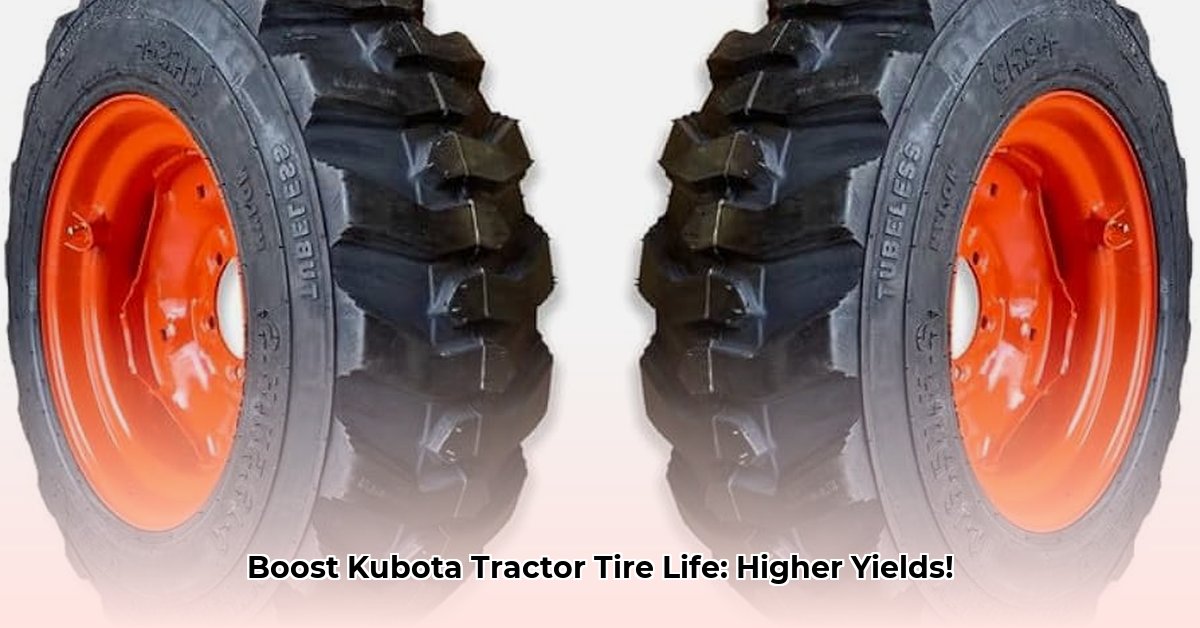
Choosing the right tires for your Kubota tractor is crucial for maximizing yield and minimizing environmental impact. This guide provides a step-by-step approach to selecting, maintaining, and upgrading your tractor tires for a thriving, sustainable farm. For tips on tire inflation, see this helpful guide on water-filled tires.
Understanding Your Farm's Needs: Soil, Style, and Seasons
Before selecting tires, assess your farm's unique characteristics. What type of soil do you cultivate? Sandy soil requires different tire support than heavy clay. Your farming practices, such as no-till farming, also influence tire selection, prioritizing minimal soil compaction. Consider your climate; persistent wet conditions or dry summers necessitate different tire choices. Ignoring these aspects can lead to costly inefficiencies. Don't you want to maximize your investment?
Decoding Tire Talk: Size, Tread, and Construction
Kubota tractor tires vary in several key aspects that dramatically affect your farming operation:
Size: Larger tires generally reduce soil compaction, benefiting soil health, but may slightly increase fuel consumption. Smaller tires offer maneuverability but potentially increase soil compaction. The optimal tire size depends on your specific needs and field conditions.
Tread Patterns: Aggressive treads provide superior traction in challenging terrains, but may increase soil disturbance. Less aggressive treads minimize compaction but might sacrifice traction in wet conditions. The correct tread pattern depends on soil type and weather.
Tire Construction: Radial tires generally offer better fuel economy and a smoother ride, while bias-ply tires are more durable but consume more fuel. The best choice depends on whether you prioritize fuel efficiency or longevity.
Choosing Your Perfect Kubota Tires: A Step-by-Step Guide
Selecting the right tires is a systematic process:
Assess Your Farm: Thoroughly evaluate your soil type, typical weather, and farming practices. Identify recurring challenges to inform your choices.
Consult Kubota: Utilize Kubota's resources and support team for recommended tire options for your specific tractor model.
Seek Expert Advice: Consult agricultural equipment specialists or experienced farmers in your area for valuable insights.
Compare Tire Specifications: Create a table comparing tire size, tread pattern, construction, and price. Consider long-term costs including fuel economy and lifespan.
Prioritize Long-Term Value: Don't solely focus on initial cost. Calculate long-term costs based on lifespan and fuel efficiency to select the most economical and sustainable option.
Tire Inflation: A Simple Act with a Huge Impact
Proper tire inflation is crucial. Underinflation increases soil compaction, reduces fuel efficiency, and accelerates tire wear. Overinflation can damage tires and reduce traction. Regularly check tire pressure using a reliable gauge. This simple action significantly impacts your farm's efficiency and profitability. Isn't consistent monitoring a small price to pay for long-term sustainability?
The Future is Green: Sustainable Tire Trends
Sustainability is reshaping agricultural technology, including tire manufacturing:
Eco-Friendly Materials: Tires made from recycled or renewable materials are gaining traction, minimizing the environmental impact of farming. Ongoing research explores even more sustainable options.
Smart Tires: Smart tire technology with embedded sensors provides real-time data on pressure, temperature, and wear, enabling proactive maintenance and maximizing efficiency. This developing technology promises greater efficiency and sustainability in the future.
Dr. Emily Carter, Professor of Chemical and Biomolecular Engineering at Princeton University, notes, "The development of sustainable tire materials is crucial for reducing the environmental footprint of agriculture. Innovative materials and manufacturing processes can significantly decrease the carbon emissions associated with tire production and disposal."
Keeping Your Tires in Top Shape: Maintenance for Longevity
Regular maintenance extends tire lifespan and optimal performance. This involves:
Regular Cleaning: Remove mud, debris, and other elements that can damage tires.
Visual Inspections: Regularly inspect tires for cuts, punctures, and other signs of damage. Early detection prevents costly repairs.
Proper Storage: Store tires appropriately when not in use to prevent damage and degradation.
By following this comprehensive guide, you'll optimize your Kubota tractor tires for enhanced performance, environmental responsibility, and a more profitable farm operation. Remember, the right tires are an investment in your farm's long-term health and success.